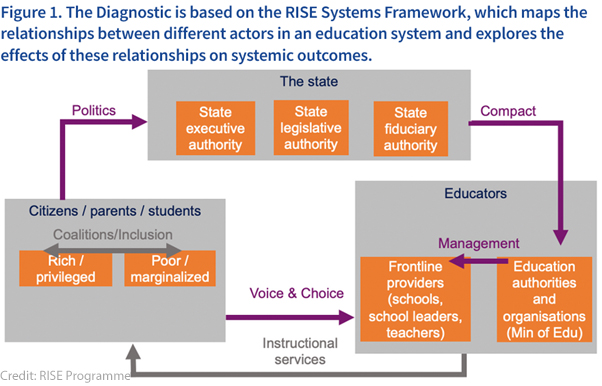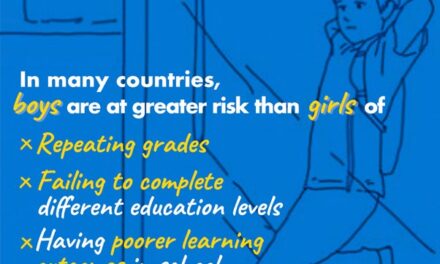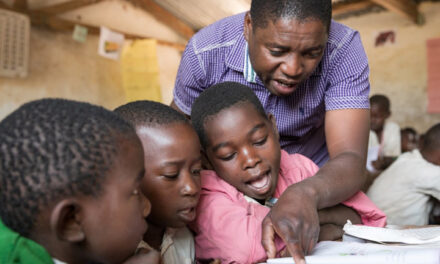This blog was written by Gautam Anand, Dewi Susanti and Tien Sing Tay. It was originally published on the RISE website on 26 January 2023.
The RISE Education Systems Diagnostic is a tool for identifying strategic priorities for education system reform. In the fourth blog in this series, we hear from Global School Leaders, one of the organisations that piloted the Diagnostic in 2022.
Global School Leaders (GSL) aims to strengthen school-level leadership in low- and middle-income countries (LMICs) to build meaningful instructional systems that can influence student outcomes. Our research identifies the conditions that enable successful school leadership and improve student performance and well-being. Currently GSL works in 13 LMICs to catalyse local organisations to deliver and scale high-quality training to school leaders. We collaborate closely with our partners to generate practice-based evidence in Brazil, India, Indonesia, Malaysia, and Kenya.
There is growing evidence that strong school leadership and management improve student learning outcomes at schools (Grissom et al., 2021; Scur et al., 2021). It is, therefore, critical that we develop a comprehensive understanding of the education systems within which school leaders and education officers, middle management staff within the local education bureaucracy, operate and whether and how the education systems can better harness their abilities and effectiveness in supporting teaching and learning.
The RISE Systems Framework (Pritchett, L., 2015; Spivack, M., 2021) helps uncover the complex relationships and networks of actors in the education administrative hierarchy who provide support to school leaders. This blog highlights three organisational learnings for GSL and its partners from using the RISE Systems Framework:
- The framework helps us comprehensively diagnose an education system from the perspectives of school leaders and education officers.
- It categorises five elements – delegation, information, finance, motivation, and support – within the management of school leaders and education officers that help identify gaps between policies and their implementation.
- The framework also serves as a methodological tool to organise our research along the five elements.
The RISE Systems Framework as a diagnostic tool
The RISE Systems Framework provides us with a comprehensive structure to understand the education system from the vantage point of the school leaders or education officers as agents and to identify key actors that influence their work.
For school leaders, we utilise the framework to identify the incoherence within the system that restricts school leaders’ ability to improve teaching and learning. Our use of the framework focuses on the management relationship between education authorities at district, state, and national levels (as principals) and the education officers and school leaders (as agents) across the elements of delegation, information, finance, motivation, and support. From the vantage point of education officers, the framework helps us understand systemic barriers they face in supporting school leaders to improve teaching and learning at school.
While state-level education authorities are principals in the management relationship we intend to explore, we understand that these middle-tier actors are also agents in their own relationship with national-level authorities. Since our approach to the diagnostic is system-level, we incorporate these nuances in our diagnostic studies when necessary.
So far, we have piloted the diagnostic in one country for school leaders and in another for education officers. We find that the framework helps us to identify how centralised or decentralised education systems influence the autonomy of education officers and school leaders. It also helps us identify gaps between what is specified in policy documents versus actual practices.
The RISE Systems Framework identifies gaps between policies and their implementation
The framework provides a clear map of elements that need to be evaluated to identify coherences and incoherences within the system. The major focus of the diagnostic studies we are undertaking is to unpack the management relationship between education authorities at different levels (the principal) and the school leaders and education officers (agents) across the five dimensions of delegation, information, finance, motivation, and support.
We find that there is significant overlap across these dimensions and they cannot be looked at in silos. For example, major responsibilities delegated to school leaders require them to spend a lot of time on data collection and reporting; however, existing policies often lack a clear framework for this information to be shared back to strengthen their work or calibrate expectations from them.
Similarly, education officers are required to support school leaders in improving school management as well as teaching and learning; however, they do not have financial resources or autonomy to go beyond set parameters that restrict their ability to effectively solve problems at school.
We also find a significant gap between what the policies specify for priority content of professional development for school leaders and education officers and the actual opportunities available to them to participate in those training.
Hence, the lack of direct feedback, financial resources, decision making autonomy, and support could demotivate and discourage professional growth of school leaders or education officers.
The RISE Systems Framework as a methodological tool
Finally, we find that the framework can be both a diagnostic and a methodological tool. While it helps us identify elements of an education system in a specific context, it also offers ways to study the elements using a variety of research methods such as literature review, workshops, in-depth interviews, and surveys. (See our more comprehensive methods note to learn more.)
The framework’s emphasis on conducting an in-depth literature review of policy documents and academic and non-academic publications helps us unpack the alignments and misalignments within the education system and how they can restrict a school leader’s or an education officer’s effectiveness in improving teaching and learning.
The literature review allowed us to identify stakeholders who were consulted to provide feedback on our research design. It also helped us identify themes that guided the formulation of workshop questions and discussion points for a diverse group of actors. (See an example of a presentation that can be adapted to guide a workshop.)
We then used these themes and high-level insights from the workshops to look at existing surveys on school leadership and management to see how these issues are formulated in the form of questionnaires. Situating this learning in a country context, we designed a nationally representative sample of school leaders to unpack both individual and system-level constraints. (See the survey questions that we developed and can be adapted for different contexts.)
Next steps
In conclusion, the RISE Systems Framework provides us a comprehensive framework to unpack the binding constraints and challenges that a school leader or an education officer within the education system faces. It also provides scope for strengthening the methods being used.
We plan to continue piloting the diagnostic tools in other countries, especially where we aim to implement capacity building programs for school leaders and education officers. We also plan to strengthen the gender lens of the diagnostic tools to understand the differences in systemic barriers and constraints that male and female school leaders face.
Where possible, we would like to complement the diagnostic tools with representative samples of school leaders or education officers within certain geographical contexts. It would be useful to survey other actors in the education hierarchy to triangulate and verify claims.
—–
RISE blog posts and podcasts reflect the views of the authors and do not necessarily represent the views of the organisation or our funders.





